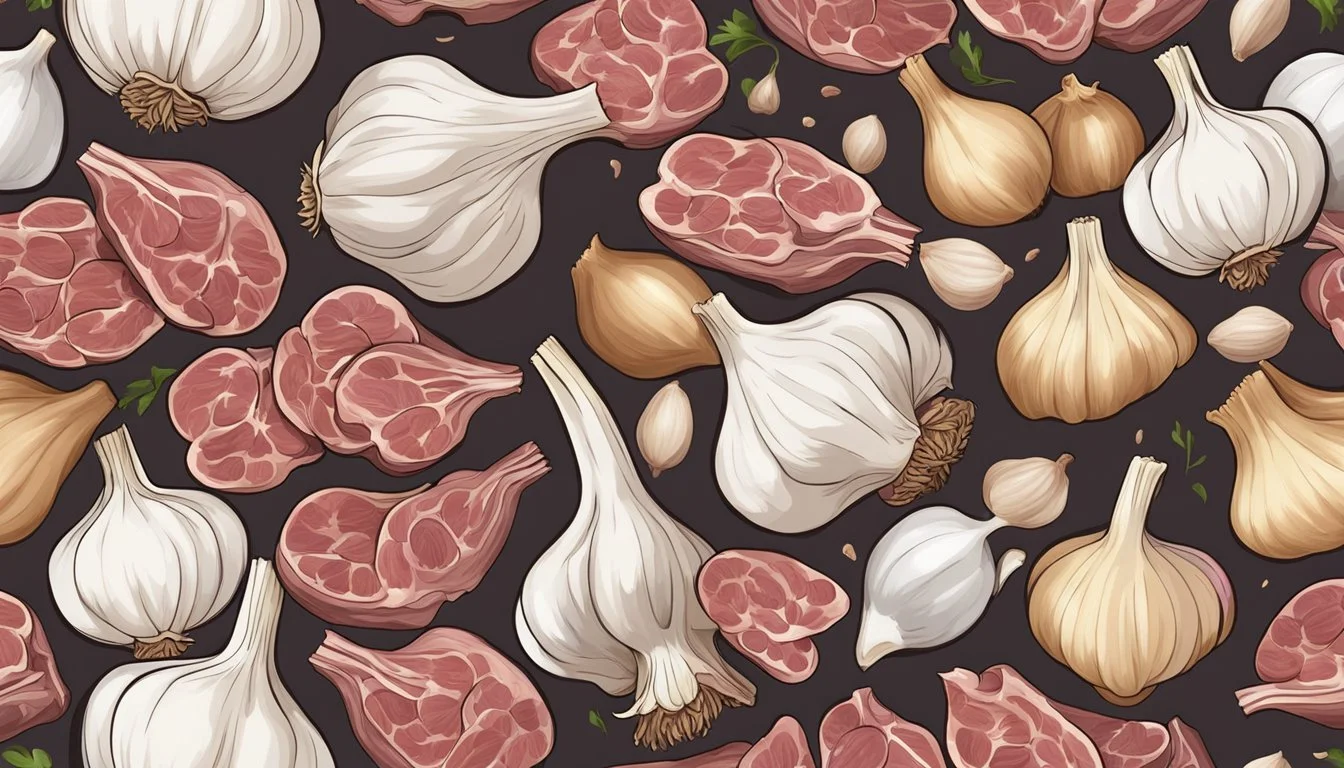Carnivore Diet Garlic
Benefits and Culinary Uses
The carnivore diet, an eating regimen centered solely around animal products, is gaining attention for its simplicity and potential health benefits. This diet endorses the consumption of meats, seafood, organs, eggs, and selected dairy products, such as cheese and heavy cream. Within this dietary framework, the use of seasonings and condiments often comes into question, particularly concerning those derived from plants.
Garlic (What wine goes well with garlic?), despite its plant origin, is sometimes considered an optional component in the carnivore diet due to its culinary versatility and reported health advantages. Noted for its antibacterial, antiviral, and antifungal properties, garlic is also a recognized source of vitamins and minerals like vitamin C, vitamin B6, and manganese. These attributes have led some followers of the carnivore diet to include garlic, in moderation, to enhance flavor and potentially reap its nutritional benefits.
However, it's important for individuals on a carnivore diet to consider their personal goals and digestive tolerance when introducing any plant elements to their meals. While the diet typically excludes plant-based foods, the inclusion of certain herbs and spices can be discretionary, and thus garlic may be appropriately integrated as a flavor enhancer without deviating from the diet's principles.
Understanding the Carnivore Diet
The carnivore diet focuses on the consumption of animal products and excludes plant-based foods. It is designed to align with ancestral eating practices and is often compared to other low-carb diets.
Principles of Carnivore Eating
The carnivore diet revolves around a zero-carb approach, emphasizing that one should eat only animal products. This elimination diet mainly consists of:
Meats: Beef, pork, lamb, game
Seafood: Fish, shellfish
Organs: Liver, kidney, heart
Eggs: Whole eggs
Dairy: Milk, cheese, heavy cream (but often limited)
Some adherents include small quantities of select animal-sourced condiments like butter and bone broth. A strict carnivore diet excludes all plant matter, aiming to induce a metabolic state potentially similar to ketosis, where the body burns fat for fuel in the absence of carbohydrates.
Comparing Carnivore and Ketogenic Diets
While both the carnivore and ketogenic diets restrict carbohydrates to induce ketosis, their methodologies differ. The ketogenic diet allows for plant-based foods and focuses on high fat intake. In contrast, the carnivore diet is more restrictive:
Diet Comparison: Carnivore Diet vs. Ketogenic Diet
Carnivore Diet
Zero-carb
Animal products only
No carb counting
Simpler food choices
Ketogenic Diet
Low-carb, high-fat
Includes plants and fats
Carb counting essential
Diverse food selections
Both diets are used as an elimination diet for identifying food intolerances and can lead to significant weight loss. The restrictive nature of the carnivore diet may also lead individuals to a version known as the lion diet, which narrows consumption to ruminant meat, salt, and water.
The Role of Garlic in the Carnivore Diet
The carnivore diet emphasizes animal products and typically excludes plant-based ingredients, but garlic occupies a unique position as it is often considered for its flavor and potential health benefits.
Garlic: A Flavor Enhancer
Garlic, a bulbous plant, is prized for its ability to enhance the flavor of various dishes. Within the framework of the carnivore diet, garlic is sometimes used optionally. Those who include it argue that it can improve the taste of animal proteins, making them more palatable and enjoyable. Garlic usage varies from fresh cloves to minced forms, but always in moderation as it is not a core element of the diet.
Health Implications of Garlic Consumption
Garlic is well-known for its potential health benefits. It contains compounds such as allicin, which is associated with an improved immune system and antioxidant properties. However, some individuals on the carnivore diet report digestive issues upon consuming garlic, possibly due to its natural compounds disrupting the gut microbiome. Thus, while garlic can offer health advantages, its consumption should be attuned to individual tolerance levels.
Garlic Powder versus Fresh Garlic
When it comes to the carnivore diet, one may ponder the choice between garlic powder and fresh garlic:
Fresh Garlic: Tends to be more potent in flavor and contains pure allicin, which might provide more pronounced health benefits.
Garlic Powder: Offers a more convenient and less intense option while still providing some level of flavor enhancement.
In either form, those opting for garlic should consider its potential impact on their dietary objectives and digestive comfort.
When it comes to getting the best deals, buying garlic powder online is the way to go!
Incorporating Spices and Seasonings
When adopting a carnivore diet, one may still enhance the flavor of meats using a select group of spices and seasonings. Attention to detail in selecting condiments that align with the diet's principles is crucial for maintaining its benefits.
Utilizing Salt and Pepper
Salt and black pepper stand as fundamental flavor enhancers in the carnivore diet. They are not only essential for taste but also aid in improving digestibility.
Salt: An electrolyte crucial for hydration.
Black Pepper: Contains piperine, which can aid in digestion.
For the most extensive selection, I suggest buying salt and black pepper online!
Selecting Carnivore-Approved Condiments
Those on a carnivore diet often prioritize condiments free from sugar and artificial additives.
Mustard: Opt for varieties without added sugars.
Butter: Pure, unsalted butter can be used for cooking and flavoring.
Herbs and Spices on a Carnivore Diet
Herbs and spices must be used judiciously on the carnivore diet, with a focus on those offering health benefits and minimal anti-nutrient content.
Rosemary and Oregano: May be used for their antimicrobial properties.
Turmeric and Cinnamon: While not universally accepted, some individuals incorporate these spices for their anti-inflammatory properties.
Animal Products and Nutrition
In the carnivore diet, animal products are lauded for their dense nutritional profile, supplying essential vitamins and minerals, as well as high-quality protein and fats. Here's an insight into the nutritional benefits of meat, dairy, and eggs within this dietary pattern.
Health Benefits of Meat Consumption
Meat, especially ruminant meats like beef and lamb, is a powerhouse of nutrients. It provides high-quality protein which is essential for muscle repair and growth. Meat also contains heme iron, which is the type of iron more easily absorbed by the body, aiding in the prevention of anemia. Ruminant meat is also a source of conjugated linoleic acid (CLA), which has been linked to reduced body fat.
Vitamins and Minerals in Animal Foods
Animal products are a key source of many vitamins and minerals. They include:
Vitamins: B12, which is critical for nerve function and is only found naturally in animal products; A, D, and K2, important for immune function and bone health; B3 (Niacin), which has a role in DNA repair.
Minerals: Zinc, crucial for immune function and wound healing; Selenium, an antioxidant; Phosphorus, which is important for bone health.
Organ meats such as liver are exceptionally nutrient-rich, often containing more vitamins and minerals ounce for ounce than muscle meats.
Bone broth provides minerals like calcium and phosphorus, and it's a source of gelatin, which can benefit joint health.
Eggs, Butter, and Dairy in the Carnivore Diet
Eggs are one of nature's most nutrient-dense foods, offering a great mix of fat, protein, vitamins, and minerals such as choline, which is vital for brain health.
Butter and other dairy products contribute vitamin K2 and animal fats, which help in the absorption of fat-soluble vitamins. The fat content in butter is also a mix of saturated and unsaturated fats and includes butyrate, a short-chain fatty acid beneficial to gut health.
Seafood provides omega-3 fatty acids, crucial for cardiovascular health and cognitive function, and is a staple in many carnivore diets for its high nutrient content.
Managing Carbohydrates and Plant-Based Foods
In discussing dietary choices, particularly the carnivore diet, one confronts the management of carbohydrates and the role of plant-based foods, which includes commonly used items such as herbs and spices.
The Debate Over Carbs and Fats
The carnivore diet constitutes a radical shift in macro nutrient intake, where carbohydrates are reduced virtually to zero, and fats, alongside proteins, become the primary source of energy. This dietary approach challenges the traditional perspective that emphasizes the importance of carbohydrates for energy. The carnivore diet's foundation is based on the consumption of animal products, hence plant-based foods—traditionally lauded for their fiber and micronutrient content—are entirely eliminated.
Carbohydrates, the body's standard fuel source in many diets, are absent on the carnivore diet, compelling the body to use fats for energy—a metabolic state known as ketosis. Proponents assert that this can lead to improved blood sugar control and reduced inflammation. Critics, however, point out potential nutrient deficiencies and a lack of long-term research supporting the diet's efficacy and safety.
Alternatives to Plant-Based Seasonings
Given the carnivore diet's exclusion of plant-based foods, traditional herbs and spices, many of which are derived from plants, are also omitted. Carnivore diet adherents must find alternatives to plant-based seasonings to enhance the flavor of meals without compromising the diet's strict guidelines.
List of Carnivore-Friendly Seasoning Alternatives:
Salt: Enhances flavor and is essential for electrolyte balance.
Animal Fats: Can be used to add richness; examples include butter, tallow, and ghee.
Bone Broth: Offers a depth of flavor for soups and stews.
Fish Sauce: A possible addition for umami flavor, though it may contain tiny amounts of plant extracts.
Fermented Dairy Products: Such as cheese, can be used in moderation to add a different flavor profile.
These alternatives focus on leveraging animal-derived products to add variety to dishes while staying within the constraints of the carnivore diet.
Culinary Techniques and Flavor Profiles
When incorporating garlic into the carnivore diet, one focusses on cooking methods and the marriage of flavors and textures that both respect the diet's philosophy and enhance the taste experience.
Cooking Methods for a Carnivore Diet
In a carnivore diet, traditional cooking methods like baking in an oven are commonplace due to their simplicity and effectiveness in preparing meats. Garlic, when used sparingly and by those who choose to include it on this diet, can be baked alongside meat to infuse flavor. Garlic powder, being more concentrated, can serve as a seasoning, adding a robust aroma without introducing significant plant material.
Oven Baking: For individuals incorporating garlic into their carnivore diet, oven baking allows for even distribution of heat and the infusion of flavors, especially when combined with cuts of meat that benefit from slow cooking.
Exploring Textures and Flavors
The carnivore diet emphasizes the importance of flavor and texture, which can be adjusted through different preparation methods. For example, a sprinkle of garlic powder not only adds flavor but also provides a subtle grainy texture. Herbs like thyme, if one chooses to use them, should be used judiciously due to their plant origin. In terms of spices, paprika is generally avoided given its non-animal origin, but those including certain plant elements might add it for a smoky nuance.
Flavor Pairings: Subtle yet distinct, garlic can enhance the natural savoriness of meats. To maintain diet purity, one must consider the strength of garlic's flavor—whether fresh or as a powder.
Texture Contrast: The traditional texture of meat can be complemented by the crispiness of thinly sliced, lightly baked garlic chips, should an individual's interpretation of the diet allow for this inclusion.
Diet-Meal Planning and Preparation
Effective meal planning and preparation are essential for adherence to a carnivore diet, focusing on inclusion of diverse animal-based foods and addressing the optional use of seasoning such as garlic.
Creating a Carnivore Diet Meal Plan
A well-constructed meal plan should provide a variety of animal products to ensure nutritional adequacy and prevent monotony. For breakfast, options may include eggs cooked with ground beef or pork sausage. The inclusion of organ meats can be considered once or twice a week to maximize nutrient intake; dishes such as liver or heart can be incorporated into meals.
Monday: Scrambled eggs with crumbled ground beef
Tuesday: Chicken liver pâté spread over pork rinds
Wednesday: Pork sausage patties with fried eggs
Prepping Carnivore-Friendly Meals
Preparing and storing meals helps maintain diet consistency. When preparing carnivore foods, one should consider cooking in bulk, such as roasting a whole chicken or slow-cooking a beef brisket, which can serve multiple meals. For convenience, meats can be portioned and refrigerated or frozen. Cooking with fats like butter or tallow enhances flavor, and using spices, including garlic, is a personal choice within the carnivore diet framework.
Meal Prep Tips:
Bulk cook ground beef and divide into meal-sized portions.
Pre-cook organ meats such as liver or kidney, and keep them accessible for quick meals.
If including seasoning, prepare garlic-infused butter to add to cooked meats for added flavor.
Health Objectives and Weight Management
In the context of a carnivore diet, understanding the role of garlic in relation to health objectives and weight management becomes crucial. The ensuing discussion highlights garlic's potential impacts on wellness and weight loss endeavors within this dietary practice.
Pursuing Health and Wellness Goals
Individuals following a carnivore diet often prioritize health goals such as enhanced immunity and improved metabolic markers. Garlic, with its noted antibacterial and antiviral properties, may contribute beneficially in this regard. It is also a source of essential nutrients like vitamin C and vitamin B6, which are pivotal for maintaining health. Moreover, garlic contains manganese, an element important for several body functions including bone health and blood sugar control.
Though predominantly an animal foods-based diet, incorporating garlic could offer an added advantage by potentially aiding in the regulation of blood pressure—an essential component of cardiovascular health. It's important that individuals consider their digestive tolerance to garlic, as excessive consumption could lead to gastrointestinal discomfort.
Carnivore Diet for Weight Loss
When aiming for weight loss, those on a carnivore diet typically focus on high protein and fat intake with minimal carbohydrates. Garlic, being low in carbohydrates, is often seen as compatible with this diet approach when used in moderation. The primary foods in a carnivore diet—various meats, eggs, and dairy—provide satiety and help maintain muscle mass during weight loss.
The effects of garlic on weight loss are not universally consistent and may vary between individuals. Some may experience no hindrance in their progress, while others might find garlic to be less beneficial for their specific weight management goals. Users should adjust their intake according to personal health objectives and the body's response, keeping in line with the overarching goal of weight loss if it is a priority.
Addressing Additives and Food Safety
When adhering to a carnivore diet, individuals should carefully consider the safety and regulatory aspects of condiments and preservatives to maintain diet integrity and health.
Navigating Preservatives and Chemicals
Preservatives and chemicals are often added to food products such as mayonnaise, ketchup, hot sauce, and BBQ sauce. These additives can include added sugars and antinutrients, which go against the foundational principles of a carnivore diet. The carnivore diet emphasizes the elimination of plant-derived ingredients, focusing on meat and animal products.
Mayonnaise: Often contains preservatives like vinegar or lemon juice to maintain freshness. Some varieties may include added sugars.
Ketchup: Typically has high levels of added sugar, making it less suitable for a strict carnivore diet. Homemade versions without sugar can be considered.
Hot Sauce: Can vary widely in ingredients. Some contain preservatives like xanthan gum but can be free of added sugar and acceptable in small quantities.
BBQ Sauce: Generally high in added sugars and preservatives, it's recommended to avoid it entirely on a carnivore diet.
Understanding FDA Regulations and Health Risks
The Food and Drug Administration (FDA) oversees food safety and attempts to mitigate health risks associated with food additives. Toxins such as lead, which may lead to lead poisoning, are strictly regulated. Condiments and sauces often have a long list of ingredients that are FDA-approved, yet they may still present risks if they conflict with the carnivore diet's principles and goals.
Preservatives: Recognized as safe by the FDA but should be assessed for compatibility with a carnivore diet.
Maple Syrup: Although natural, it is a significant source of sugars and falls outside the carnivore diet regimen.
Antinutrients: These substances can interfere with nutrient absorption and are typically found in plant-based foods, which are excluded from a carnivore diet.
To ensure compliance with a carnivore diet and personal health, individuals should thoroughly read product labels and opt for condiments with minimal additives or make their own versions when possible. Consumers need to be vigilant about the potential presence of non-compliant substances and consider the impact on their dietary goals.













